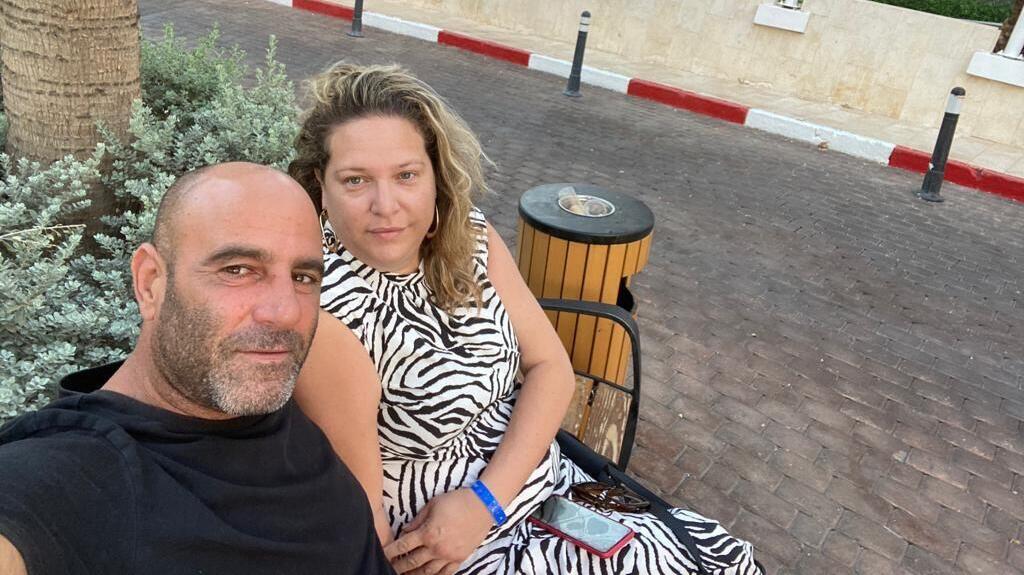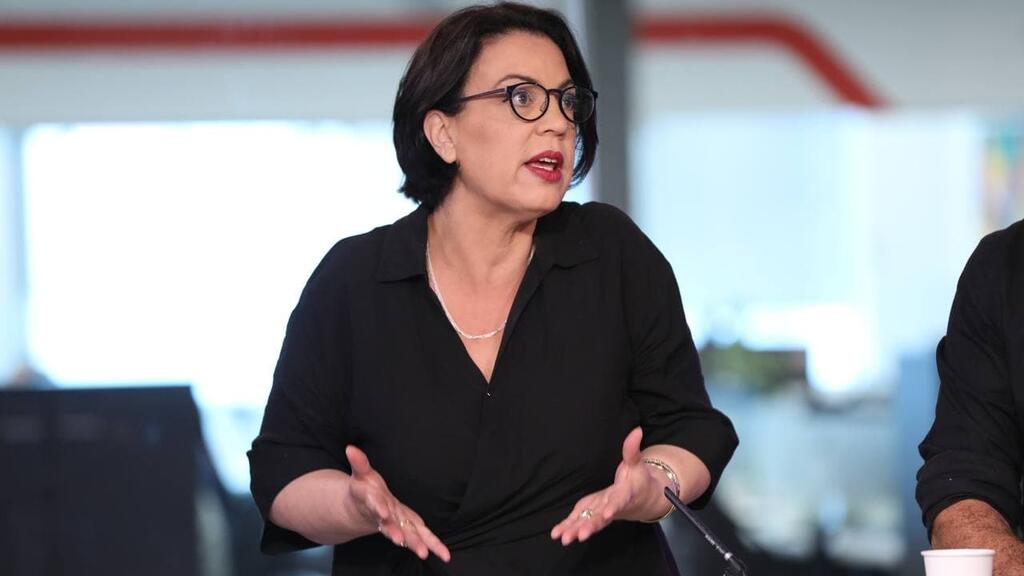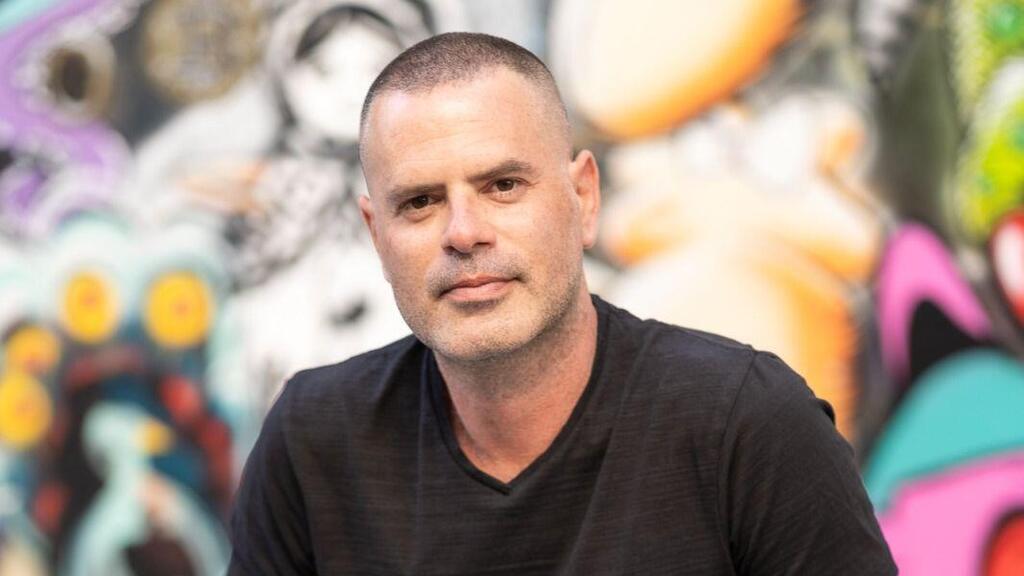The upcoming election is the talk of the day in Israel, but what happens when political discord invades our private spaces and relationships? Can they be settled in a way that won’t harm our closest personal connections?
Rotem and Oded Janeh, a couple living in central Israel’s Hadera, have been married for ten years, and have completely opposing political ideologies. While Rotem participates in rallies of left-leaning parties, Oded talks about right-leaning parties with the couple’s children.
Rotem intends to vote for Labor party head Meirav Michaeli, while Oded is still weighing whether to vote for Likud’s Benjamin Netanyahu or Otzma Yehudit’s Itamar Ben Gvir.
The two met on an online dating website after Oded’s friend set up a profile for him. “We wouldn’t have met in any other way,” Rotem says. “We weren’t sure what we had in common at first, I took acting classes and he didn’t find it interesting, but something in his appearance and build, and the fact I felt safest around him, made me fall in love with him."
The couple said they had sought relationship counseling to learn how to bridge their political differences, which have only drifted further since. “In the last two years, Oded started watching a right-leaning television channel, and it bothers me. He may think what’s being said there is the truth, but to me, it sounds like misanthropy,” Rotem said.
“I grew up in a household where we’d vote Labor and he [grew up] in a Likud bastion. We knew about it when we met, but it wasn’t a big deal then,” Rotem added. “But today it presents an obstacle in our relationship, when the political talk begins, so does the anger,”
Oded, however, believes his stances are well-founded in the current reality in Israel. “There are facts, and you can clearly see only one side does the killing. That’s the truth and Rotem denies it,” he says.
Rotem adds that Oded’s entire family vote for the conservative Likud, which sometimes makes her feel ostracized. “The issue is that his entire family votes Likud, which makes me alien. They always talk politics, not only around an election,” she says.
As part of their efforts to salvage their relationship, Oded and Rotem decided to watch the news separately. “Our kids live with us, we can’t let our ego control us,” Rotem says. “They’re there when we’re watching the news and also hear the criticism and emotions that rise when we’re arguing.”
Oded adds that the two have agreed to disagree and that there are more pressing issues to argue about. “There’s no need for political unity, I don’t want to force that on her.”
The couple say that the best way to avoid friction is trying to steer away from mentioning politics. “Despite everything, even when we argue about politics, Oded is the most handsome man I’ve ever met,” Rotem says.
Another example of a couple with distinct views about policy is Likud’s MK Galit Distel-Atbaryan and her partner who, as she often shares, is a staunch leftist. When asked about their differences, she said she was glad she had someone to argue politics with and that it keeps her sharp, while not straining their relationship.
Omer and Yakir are living in Be’er Yaakov in central Israel. They met six years ago and are now married. The couple say they love each other but their political views differ greatly. Omer intends to vote for Benny Gantz's National Unity, while Yakir is still undecided on which right-wing party to vote for.
“I don’t vote right or left, I vote for a specific individual,” Omer says. “I’m voting for Gantz because I believe in his values, and you need people like him in government to push those ideals.”
Meanwhile, Yakir voices a more hawkish stance owing to months of rising tensions with the Palestinians and recurrent terror attacks.
“I decided to vote for the right because Israel is in a sensitive security situation, and the ones in government should be someone with a Jewish, right-wing national interest, rather than a minority with conflicting security interests.”
Yet, the two agree to not allow their differences to come between them. “We both have our own opinions, and each of us understands that the other is entitled to their opinions and that it’s fine that we have disagreements.”
The couple says they don’t usually argue politics between them but do so when the subject comes up in conversation with family and friends. "I tell him that I think he's an extremist and he responds that it is unthinkable to vote for a leftist government, but we choose not to fight over it because there are bigger fights to be fought once the elections are over,” Omer says.
Yakir concludes that the choice of who to vote for is made by each one of them individually and not as a couple.
“You need to know when to press on and when to let go, when we met, we didn’t talk much about politics, and I don’t think it’s something you should talk about, especially if you disagree. Today, we talk about everything, and maintain our relationship despite our differences.”
When asked if they fight when one political side beats the other, the couple said: “We can’t be happy for the other person, someone will be disappointed. But still, partners don’t necessarily think alike on everything.”
Omer adds: “People whose lives center around politics may become dejected with opposing opinions, but we became a couple for reasons that don’t include politics.”
A new poll conducted by dating site OkCupid prior to the upcoming election shows that political views can be a deal breaker for people looking for a relationship. According to the poll, 60% of Israeli singles said they would prefer a partner who shares their political views.
The poll also stated that while 57% of singles bring the topic up with potential partners, only 7% do so on the first date, and that younger demographics in Israel say they would most likely not compromise on their potential partner having different political opinions to theirs.
Nir Cohen, a single man from Rishon Lezion, believes his political opinions should align with his partner's because they also reflect on a person’s personality, daily routine and beliefs which may cause friction down the road.
But he notes he also avoids conversing about politics on a first date. “It’s not a subject I talk about in my daily life. I want to have fun on first dates, and politics is a heavy subject to talk about.”
“We’re complex creatures and everyone comes with their own beliefs,” Cohen adds. “I know how to accept different opinions, but if the opinion is too extreme, it could manifest itself in other areas in life, and I don’t want that. As a single man, I can control what I want and don’t want.”
“I’m a person who really loves his country,” Cohen says. “I’m proud to serve in the IDF and get annoyed with people who hate Israel and want to leave. But if I meet someone with a different opinion who was still willing to hear my side, I think it could work out. You should always take interest before completely disregarding someone, and mocking their convictions."







